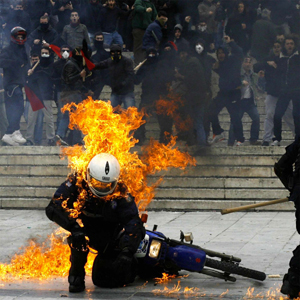Most readers know that poetry does not function the same way essays do, but political content often makes the difference harder to see. So when a poem suggests that artists “corner, beat and mug rich people” in order to halt the process of gentrification, we are tempted to argue about the political efficacy of violence, even if we do not treat most poems as testable maxims. It is not that the poem refutes its own call to violence, or claims it ironically, or rejects politics from the privilege of its safe remove. It’s that it does more than one thing at a time, at once stating a claim and stating that the claim is poetic—that is, not all it appears to be.
This misreading is partly the poem’s fault, of course. “Poem that is Pro-Violence” appears in Democracy Is Not for the People, a book of poetry entirely “in prose” (though not exactly of prose poems) that is full of similarly explicit, counterintuitive calls for violence, sacrifice, and poetic and political excess. (The cover features a full-color photo of a policeman in flames at a riot.) It is tempting to read this poem—in which “poets and artists appear to the wealthy as the fantasy that exploited classes accept, and even value, their exploitation”—as a useful guide to the book’s politics, if only because those politics are so aggressively inscrutable.
Because of this, many responses to this poem deal only with the claims it makes, rather than with those claims’ form or context. But that it is a poem—and that poetry’s politics are not identical to the literal sense of its utterances—is clear within the context of the whole collection. “Poem that is Pro-Violence” immediately follows “Poem that is Pro-Heaven,” in which Kaplan “proves” that people must become animals and commit immoral acts to reach heaven, because “humans can only approach the gods by deviating from their likeness.” The propositional logic of “Poem that is Pro-Heaven” mirrors that of “Poem that is Pro-Violence”—and thereby complicates it, if only because it’s difficult to imagine Kaplan, or any implied author, taking both positions at once.
The book coheres on account of, rather than in spite of, these contradictions. Although literature’s ability to maintain contradiction has been observed before, it is often forgotten in discussions of what is properly poetic in political poetry, and this is why “Poem that is Pro-Violence” is better than an essay. At the same time, the book can be hard to distinguish from an essay: Kaplan’s prose often reads like a Wikipedia entry, defining its terms so straightforwardly and aggressively that, by the time you come to a bizarre collage of first-person statements of intent to assassinate the president, the sense of unapologetic certainty remains.
“Ex Machina,” Democracy’s strangest poem, best exemplifies this sense of certainty maintained in spite of contradiction, and also demonstrates the book’s ability to make seemingly political claims that go beyond mere proposition. Here, appropriated descriptions of violence in Israel are interrupted by fantastic intervention:
Habeishi had hidden powerful explosives on his body, and once amongst the crowds he reached over to detonate… but suddenly, a tyrannosaurus rex, apparently attracted by the loud bustle of human activity, burst into the station, flinging Habeishi into a wall with a quick flick of its snout, knocking him unconscious. And all lived.
No excerpt makes it clearer that poetry’s politics are properly literary. Instead of calling for the implementation of such dei ex machina in real life, the poem stages politics through fantasy. This does not suggest that other, less-imaginative hopes for survival require similar fantastic logic, nor that poetry undermines its own political relevance by demonstrating its absurdity. To the contrary, it provides an exaggerated but simple reminder—emphasized again by the title—of how writing makes things possible. Democracy Is Not for the People’s strength, and its actual radical dimension, lies in its use of contradiction, in the fact that it manages to actually mean what it says—it is almost never ironic—without being identical to that meaning. It provides an intersection of poetry and politics that is not reducible to satire or to direct calls to action; it is a chance to talk about politics and aesthetics without reducing one to a banal literalizing of the other.
Publisher: Truck Books; What the book is “about”: golems, political assassination, love, Marx, sortes Vergilianae, Hamas; What poetry cannot do, according to Kaplan: loot a Foot Locker; How to prevent suicide bombing, according to the book: through the intervention of “a host of immense, sapient eagles”; Definition of xenoglossy: “the ability to speak a language one does not know”; Description of Kaplan’s poetry in the American Spectator: “a recycled graduate school paper”





